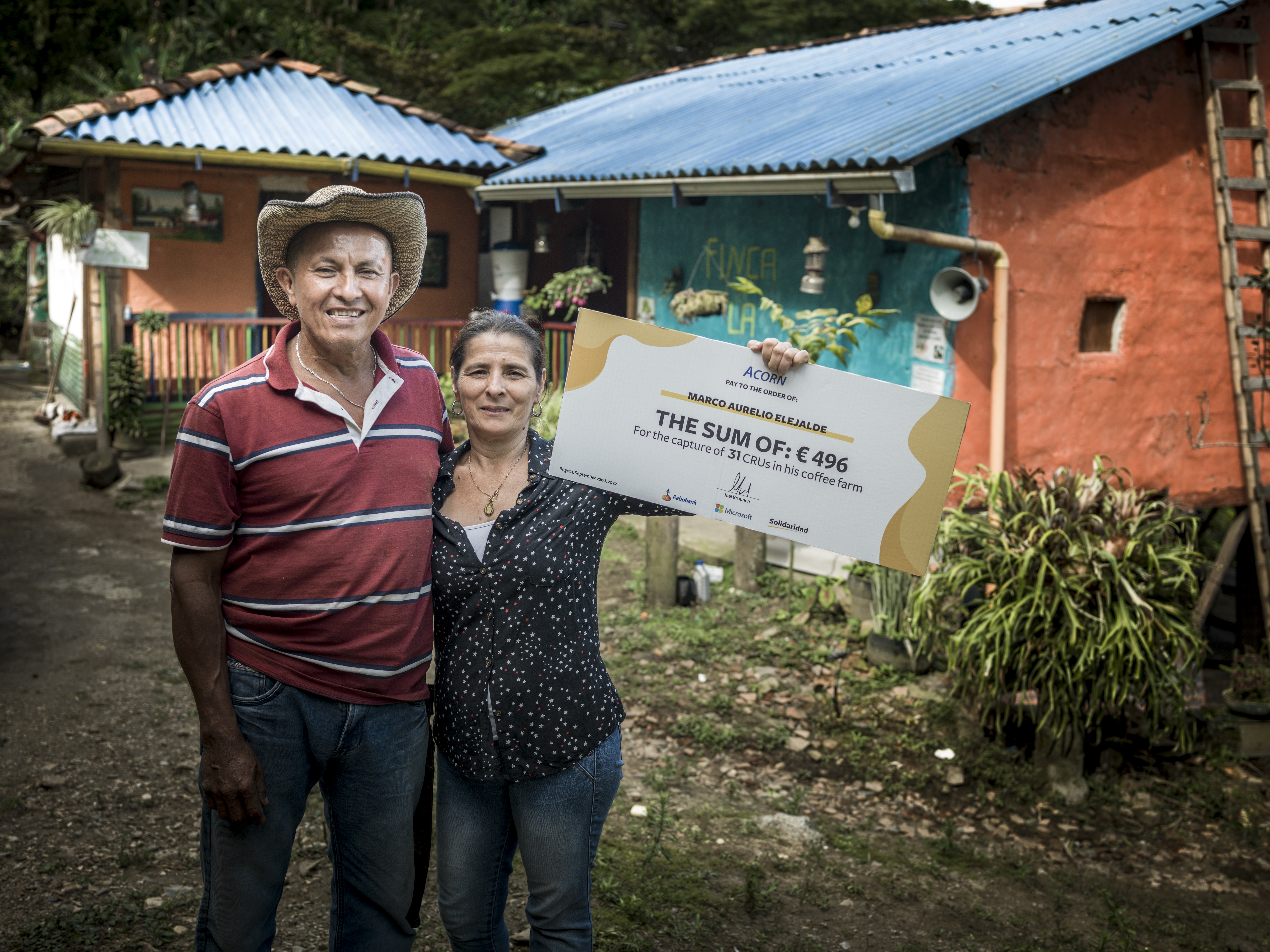Highlights
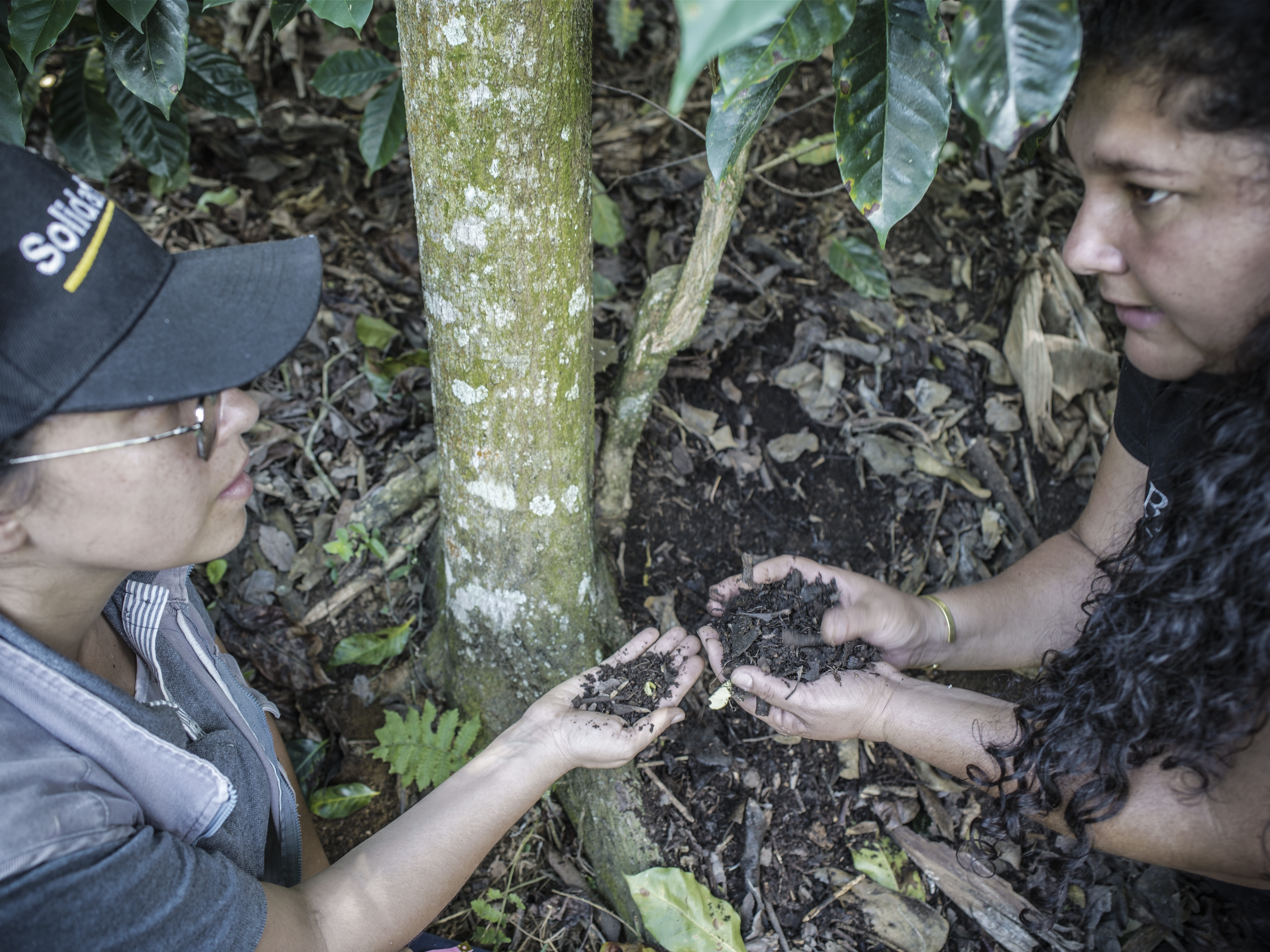
Coffee
In 2022, 674 farmers in Colombia received payments for carbon capture through the Acorn platform, and another 3,021 farmers were added to be eligible to receive payments. To prepare them we developed the Carbon Farming Academy, a platform through which we trained 164 field officers from partner companies and 5,348 producers on carbon measurements and agroforestry.
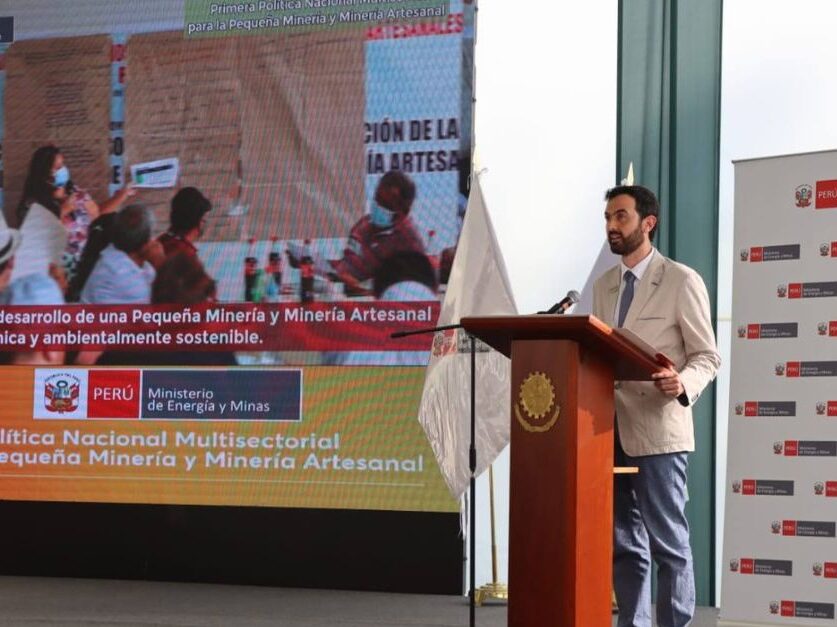
Gold
We achieved two milestones in Peru: the creation of the National Network of Women in Artisanal and Small-Scale Mining and the issue of the first Policy for Artisanal and Small Scale Mining. This will improve the alignment among stakeholders to reduce the sector precariousness, and improve access to formal value chains, mining concessions tenure and land use permits.
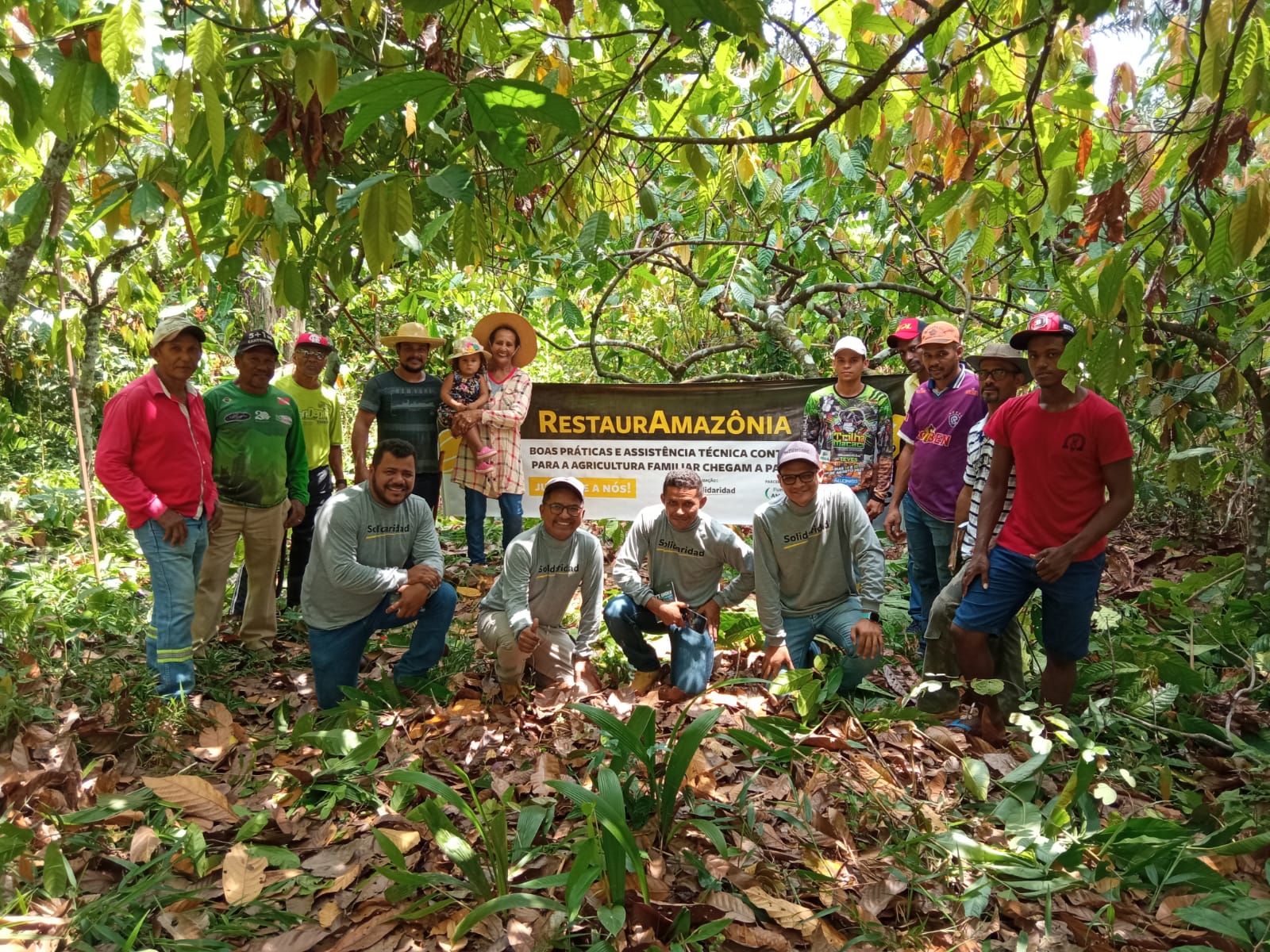
Cocoa
In Pará, Brazil, we supported 1,114 new families, implemented 215 new hectares of cocoa agroforestry systems, and were awarded a blended finance project by the Brazilian Development Bank for increasing producers’ ability to afford technical assistance. The local cooperative we strengthened, Coopercau, now serves around 50 producing families who pay for this service.
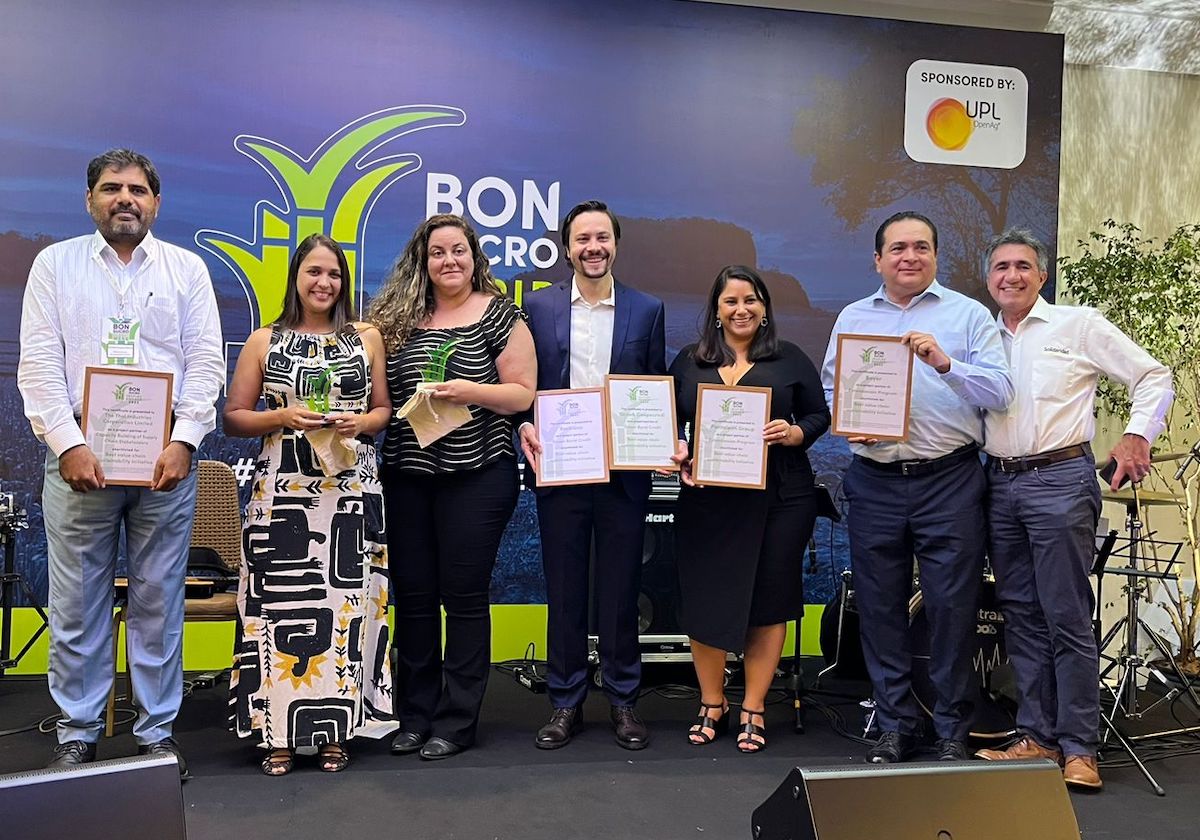
Sugarcane
Muda Cana project won the Best value chain sustainability initiative Bonsucro Inspire Award, recognizing six years collaborating with ORPLANA to strengthen service provision to more than 4,000 farmers from 23 associations in Brazil. Also, the ELO Programme entered its 8th year promoting continual improvement, reaching 2,023 suppliers from Raízen mills and covering 440,000 hectares.
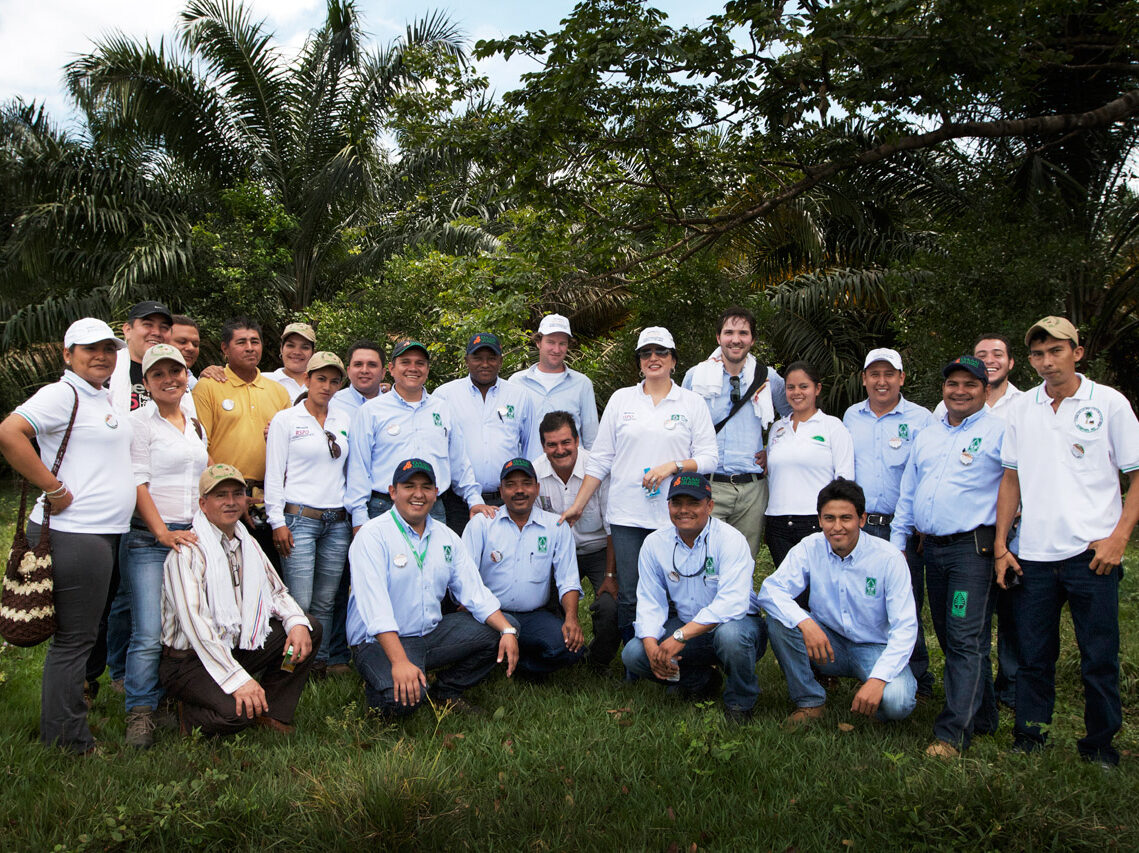
Palm oil
In Colombia, we assessed 3,731 producers and delivered training to 1,248 producers and 119 field staff to comply with APSColombia and RSPO standards. We also launched a sector initiative to advance sustainable palm oil purchases in the national market. In Peru, we trained 401 farmers and 136 workers in five producer organizations and supported RSPO certification of 800 hectares.
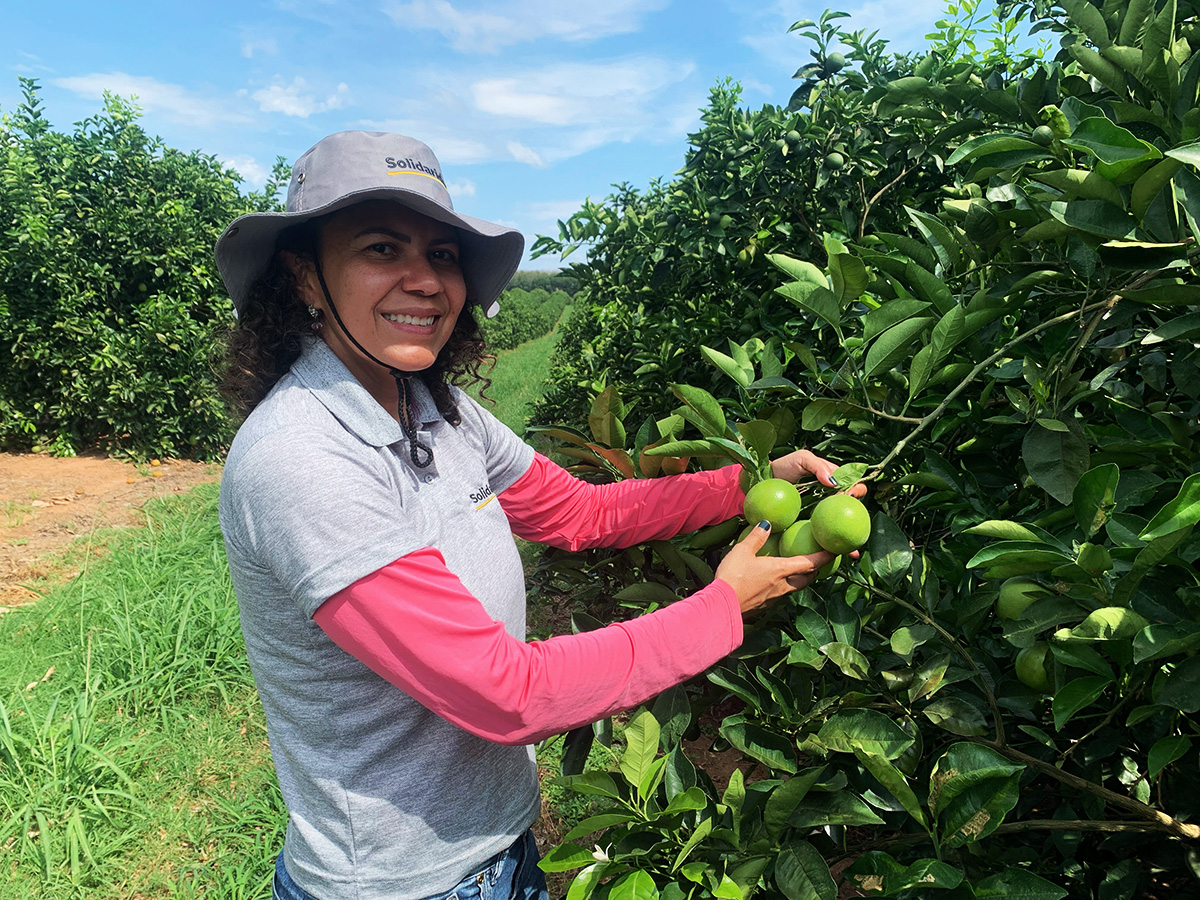
Fruit
In Peru, Ecoban, the startup that recycles plastic waste in the banana sector, received an award for contribution to a circular economy. More than 100 field staff and lead banana producers received training to produce biofertilizer. In Brazil, 140 orange producers joined our Fruto Resiliente project, and we partnered with local cooperative Montecitrus to expand it.
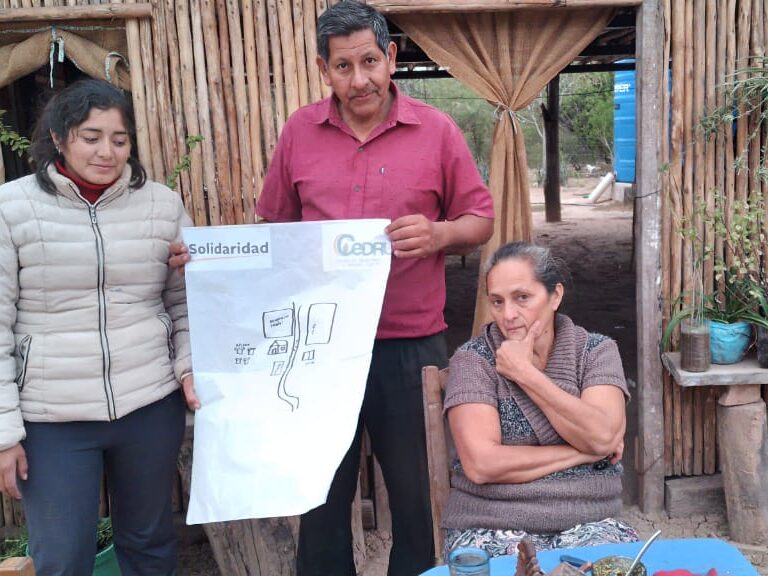
Livestock
We started working on regenerative cattle farming in the Argentinian Chaco biome, where we engaged 216 farmers and trained 160 in regenerative forest management practices. In Colombia, we co-developed a Reference Framework for Sustainable Cattle Landscapes, which was integrated into the National Policy for Sustainable Bovine Livestock.
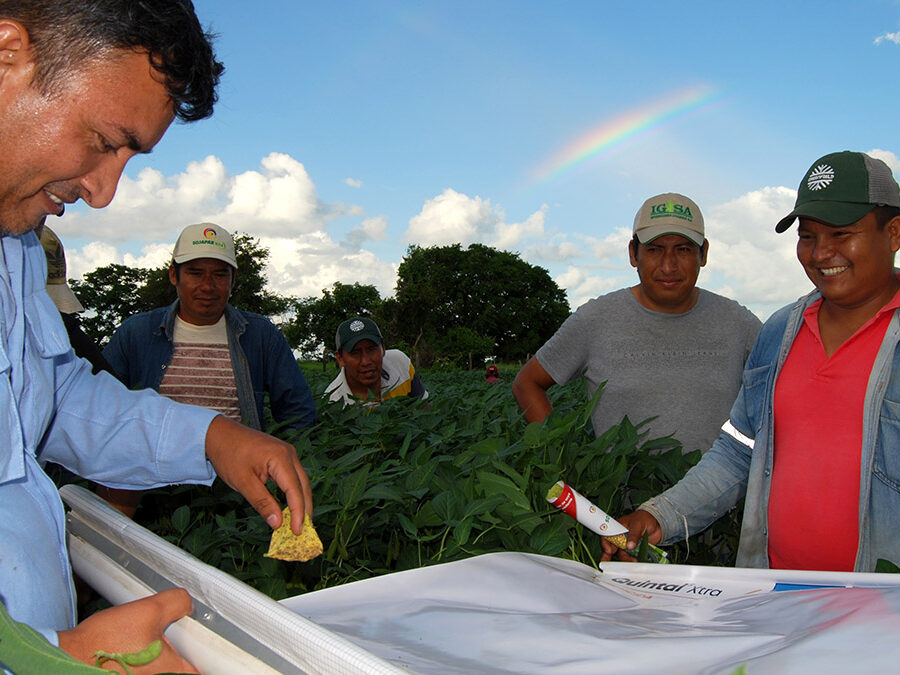
Soy
We carried out a pioneering study on carbon balance in the Matopiba region, Brazil. In Paraguay, we reached 60,713 hectares compliant with Cargill’s 3S standard among its suppliers, and another 4,848 under climate-smart practices with cooperatives. In Bolivia, we covered 21,315 hectares under sustainable management.
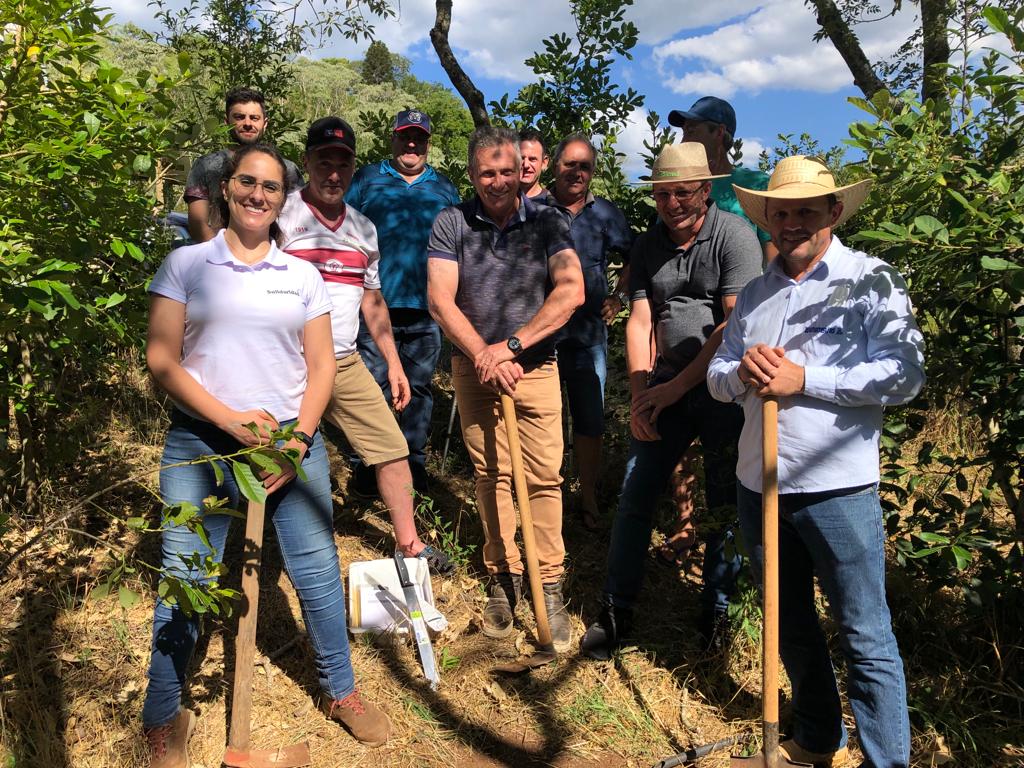
Yerba Mate
We worked to align the Coca-Cola SAGP standard to Leão Alimentos e Bebidas yerba mate supply chain in Brazil. Covering an area of 2,300 hectares, we worked with 88 smallholder families. We also held the first yerba mate meeting to discuss low-carbon agriculture, and started a project with Cargill to restore 130 hectares of Atlantic Forest with 51 producers.
Results

1.1 Million
tonne reduction of carbon dioxide emissions (tCO2e)

1.6 Million
hectares under sustainable management

12,000
farmers with farm income increase
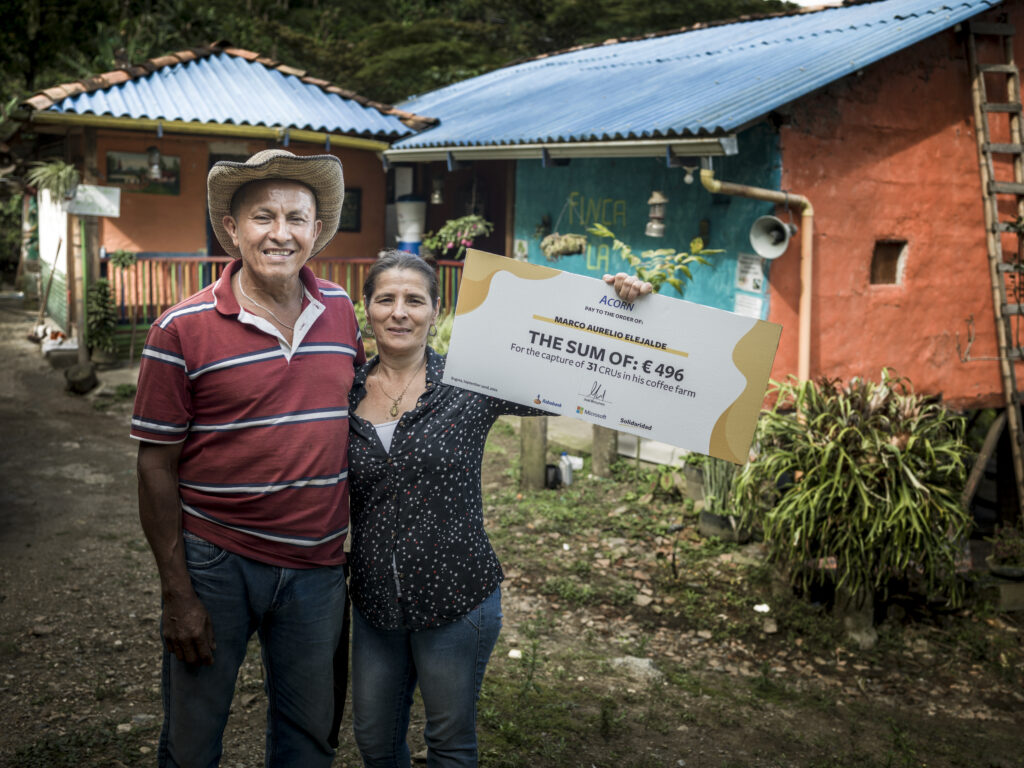
Growing (climate) smart
Our impact in 2022
We continue to support the journey towards sustainability by expanding our climate-smart proposition to cover 726,122 hectares while also conserving 235,974 hectares of native vegetation. Our impact is growing as we develop and strengthen mechanisms to provide technical assistance services to cooperatives and companies, reaching a total of 57,530 producers. We have also opened new avenues for access to finance for 1,547 producers to become sustainable. Additionally, we have backed collaborative agreements on zero-deforestation and inclusion and helped 11 companies better understand their supply chains and build expertise to comply with upcoming sustainability regulations.
RestaurAmazônia provides a comprehensive approach to sustainable development, empowering farmers and local institutions with a landscape approach that combines productive restoration with forest conservation. After successfully introducing the productive restoration model in Novo Repartimento, RestaurAmazônia is expanding to two additional municipalities in Pará, Brazil. The project integrates cocoa agroforestry systems, livestock, and forest conservation to create a sustainable economic, social, and environmental model that increases productivity and income for smallholders while reducing carbon emissions and deforestation.
In 2022, the project engaged 1,114 families to adopt low-carbon practices. The strategy includes in-person training, tailored technical assistance, the establishment of demonstration plots and monitoring using digital tools. A baseline study was carried out at the beginning of the year to understand the initial stage of practices adoption, conduct a carbon balance of the properties and map land use changes. By the end of the year, families had already implemented cocoa agroforestry systems in 215 hectares and rotational grazing in 188 hectares. In addition to this, the programme has strengthened local institutions to provide better services to producers. One local cooperative started providing technical assistance services following the model of the project and an incubation process that started in 2020. The cooperative is serving around 50 producing families who pay for the service, a concept not seen before in smallholders in the Amazon. The project aims to replicate this model in three more local organizations.
In both the Argentine and Paraguayan Chaco, we strengthened technical assistance to support producers with the implementation of climate-smart livestock practices. In Argentina, this has involved training local field staff in regenerative practices, veterinary livestock management, environmental practices, and inclusive technical assistance. We engaged 216 producers through training, resulting in 95,000 hectares on their way to becoming climate-smart. The project has also implemented an Inclusive Technical Assistance model that involves all family members in the process.
In Paraguay, a specialized technical assistance service has been provided for producers who manage large areas of productive land and forest. The service providers (CREA and CEA) have a well-developed peer-to-peer system in which producers visit each other’s farms to learn about farm management in a practical manner. The project has supported more CREA groups in Chaco, promoting the adoption of the climate-smart practices package. As a result, participating pilot farms have managed 477,000 hectares under climate-smart practices, with around 45% being forest-covered under regulation and 10,000 additional hectares being voluntarily conserved. These conserved forests amount to 1,061,195 tons of carbon stock maintained by avoiding deforestation. The project has demonstrated the effectiveness of technical assistance services in implementing climate-smart practices and achieving positive results for both the environment and livestock production.
Solidaridad has made significant strides in improving access to finance for farmers in Colombia by forging new partnerships and leveraging innovative tools. One key partnership includes collaborating with two banks — including the largest rural bank in the country, Banco Agrario — to enhance the availability of financial products for farmers in the ACORN programme and those seeking to undertake sustainable transformation processes. Another partnership with FINAGRO resulted in the creation of two credit lines, one for financing sustainable transformation processes for palm and cocoa producers, and the second for palm producers in the north of the country to purchase fertilizers in installments. Solidaridad also improved credit analysis capabilities with digital tools, resulting in the approval and disbursement of credit for 67% of the 617 farmers evaluated in 2022, with a focus on supporting smallholders.
Solidaridad’s Mining Programme played a vital role in the development and implementation of Peru’s first public policy aimed at formalizing the artisanal and small-scale mining (ASM) sector. This new policy, which was the result of a sector dialogue led by Solidaridad, aims to promote the development of the ASM with environmental responsibility, transparency, and inclusion of all actors in the value chain. Solidaridad provided technical support to the General Directorate of Mining Formalization and coordinated dialogue spaces across seven macro-regions in Peru to build awareness and validate the policy’s scope and contents in an inclusive manner.
The policy sets a new paradigm for the development and professionalization of the ASM sector, reducing the social, labor, and environmental precariousness of the ASM value chain and increasing miners’ access to formal value chains. This represents a significant shift in mindset – from viewing ASM as an activity to be eradicated and prosecuted, to recognize its potential as a key engine of labor and development in remote areas, and prioritizing its development.
Solidaridad will continue to ensure that the perspectives of vulnerable groups, including women miners and traditional miners, are included in the decision-making process on services and regulations that will originate from this new policy. This milestone policy will be the foundation for the conditions needed to improve sector sustainability and most importantly, improve miners’ access and position in formal value chains. The ASM policy in Peru sets an example for other countries with ASM miners to follow.
Solidaridad has played a crucial role in assisting various companies to prepare for the upcoming EU regulation on deforestation. In Argentina, Solidaridad has partnered with Fundación Vida Silvestre to support soy producers to achieve Cefetra Responsible Soy Standard or RTRS certification that complies with EU standards. Currently, 120,000 tons of soy are in the process of certification. Moreover, Cefretra and Zuivel NL have advanced on their commitments to purchase responsible soy from producers involved in this project.
In Ecuador, Solidaridad has supported two major cocoa traders to understand their compliance gaps regarding labor requirements. One of the traders identified compliance gaps through a Human Rights Impact Assessment, while the second company built a monitoring system for compliance with minimum labor standards within their own structure.
In Colombia, Solidaridad has assisted mills and companies in the palm oil sector to improve their information systems and comply with environmental and labor regulations. The mills’ field staff assessed 3,731 oil palm producers’ sustainability performance in 2022, following the APSColombia protocol and RSPO standards. Through a training-of-trainers strategy, a network of field staff was created to reach producers in five departments throughout Colombia. Furthermore, we established new partnerships with Henkel, a major beauty and health manufacturer, and Cargill to support small and mid-size palm oil producers directly linked to their supply chains in the transition to certification and increasing sourcing of certified palm oil from mills in the coming years. These efforts aim to ensure compliance with environmental and labor requirements and promote sustainable practices in the industry.
Change that Matters Stories
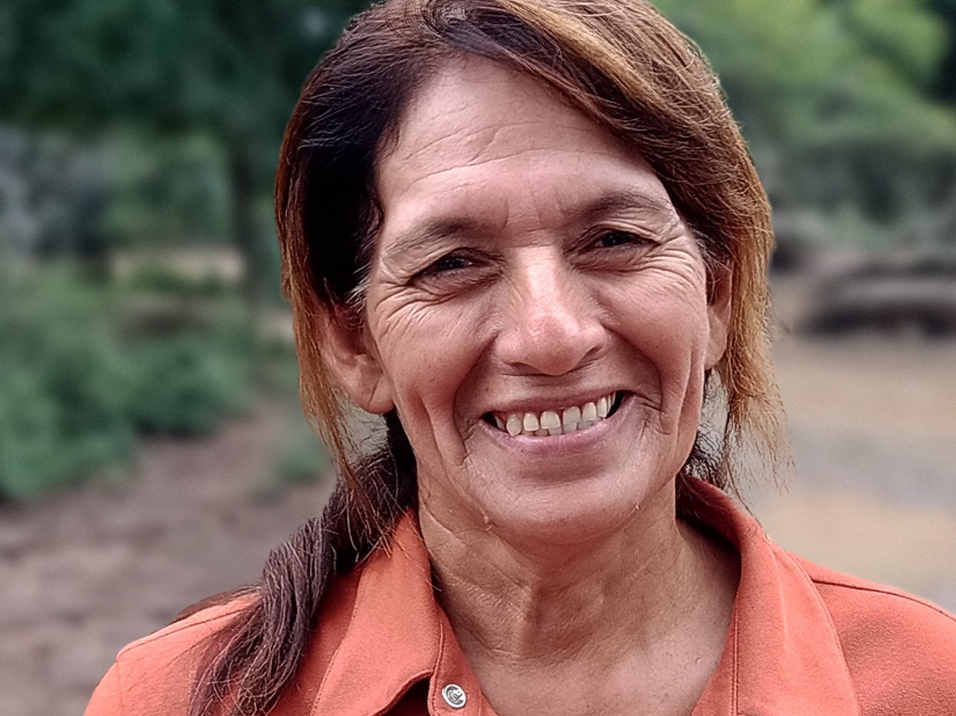
Meet Lucia: Facing Climate Change Head on in the Chaco
Lucía Ruíz is the charismatic leader of Unión y Progreso, a farmer association in the Argentine Chaco biome. Lucia builds with neighbouring farmers a sustainable cattle supply chain in harmony with the forest. Her social and silvopastoral practices do not get unnoticed, as she speaks in regional, national as well as international fora on climate, forest land rights, women empowerment, and livestock as a business.
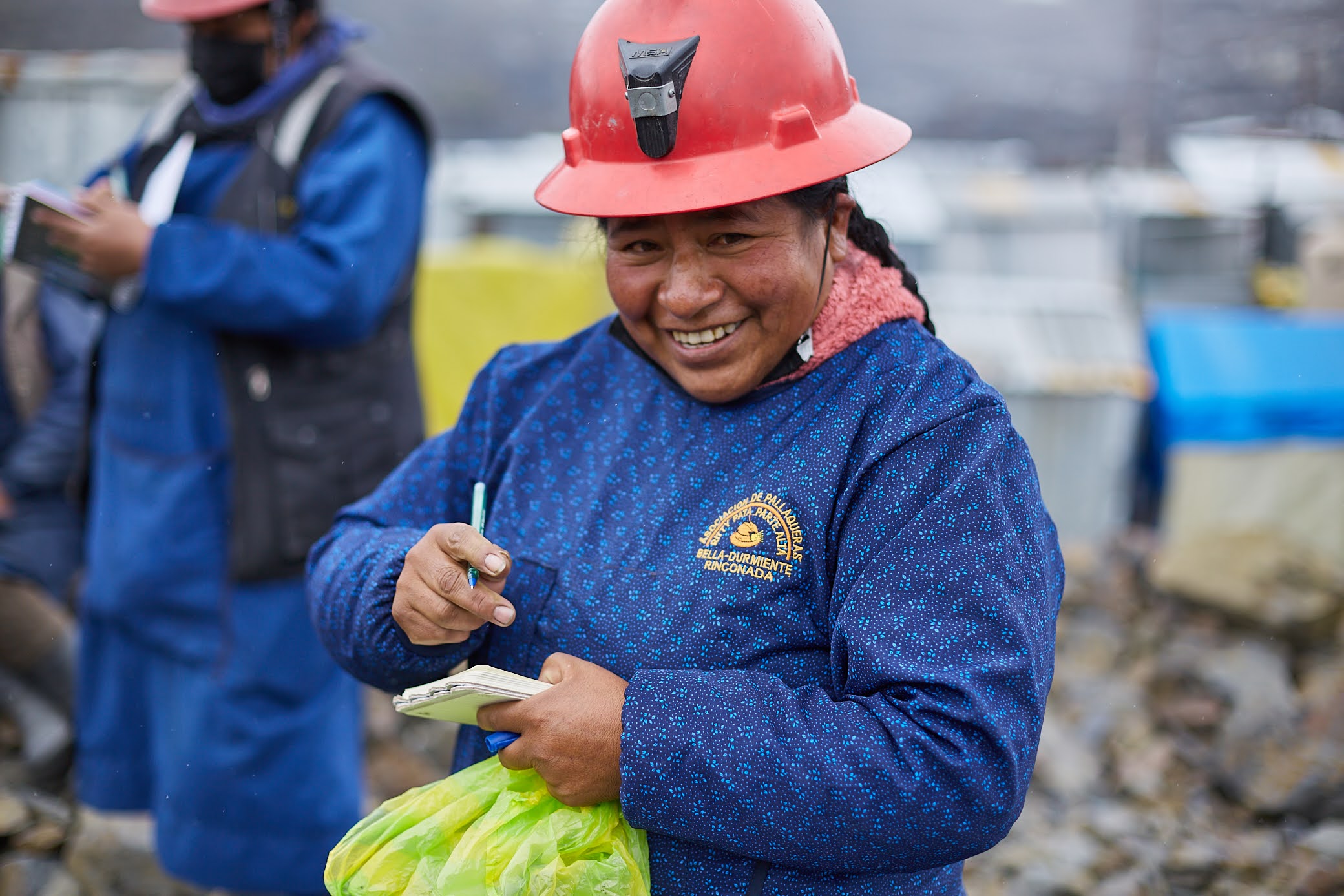
Julia: a Woman in Mining
Over 5,100 metres above sea level, among strong winds and falling snow, we can find Julia Pomalique. She works in the mountains performing pallaqueo, an artisanal and ancestral way of mining, work now done mainly by women. Thanks to this activity, she and more than 250 women in her association can sustain themselves and their families. She’s a pallaquera and she’s proud of it. However, Julia knows that with that name comes prejudice and systemic discrimination.
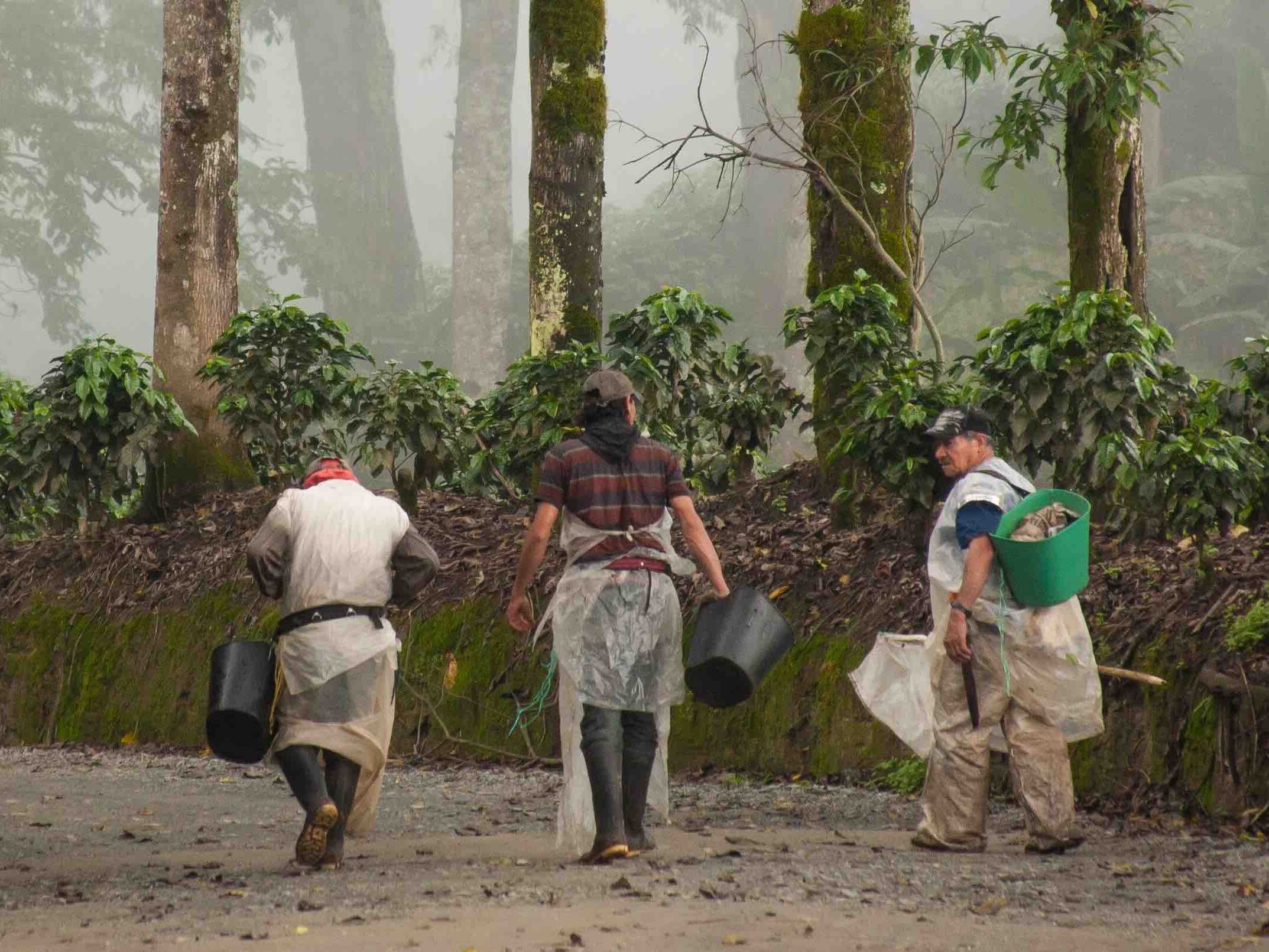
REWARDING FARMERS FOR WARDING OUR FORESTS
Doña Rosa has long known what climate change means for her farm, and she’s intent on doing her part to combat it. Joining Solidaridad’s ‘Coffee of the Future’ programme has given Doña Rosa crucial skills and tools for making sure her coffee remains good for her business and the environment
Innovative Sustainability Solutions
Social Inclusion and Fair Ownership
Improving opportunities for women and artisanal miners
Digital platforms can help to bring solutions to scale and include groups that may otherwise not be reached.
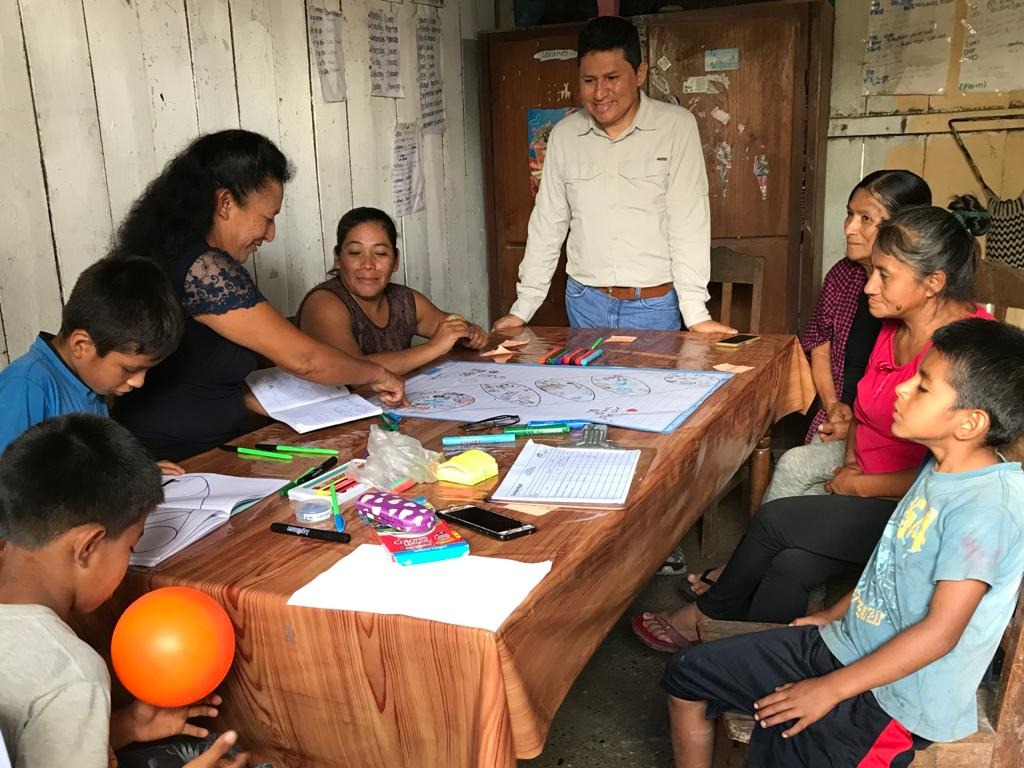
In 2022 we have taken more concrete steps to promote the inclusion of women in our programmes. One of these initiatives is the implementation of the Inclusive Technical Assistance Pilot with livestock technicians in Argentina. The objective of this pilot is to incorporate inclusive practices and strategies in the way they transfer technologies and provide training to producer families. To assess the level of adoption of Inclusive Technical Assistance, we are in the process of developing a monitoring protocol. Additionally, we have created materials for smallholder families to facilitate dialogues on equality, gender, and social inclusion. These materials aim to promote understanding and awareness of these important issues among programme participants.
Oro Justo 2.0 is a digital platform that promises to revolutionize the artisanal mining industry in Peru. The platform is based on the principles of Fair Ownership, which aim to create a more equitable and responsible industry. By providing a space where entrepreneurs can share information on prices and conditions of ore trading from processing plants, this solution enables them to make more informed decisions about their business operations. In 2022, the Oro Justo team made significant strides in bringing this solution to market. They built a team of experts and conducted extensive research with 60 miners and 4 processing plant representatives to map out the user journey and identify key priorities. They also developed a Solution Requirements Document and created a dummy app to test the initial UX concepts and business model elements in the field. These actions represent a significant step forward in the development of Oro Justo 2.0 and are helping to pave the way for a more responsible and sustainable artisanal mining industry in Peru.
Solidaridad has further consolidated its leading position in climate. By facilitating the Zero-Deforestation Agreements, the organization proactively supports several sectors in preparing the upcoming regulatory frameworks and builds networks between the public and private sectors around sustainability to advance on collective impact. This is achieved through several multi-stakeholder platforms, including hosting the Tropical Forest Alliance, in in Colombia, Peru, Argentina, and Paraguay. Solidaridad is also leading discussions on carbon measurement and credits in Colombia and Peru through a partnership with Acorn.
Organization & Governance
Reaching new heights
Growing our team and our borders
In 2022 we took the first steps to integrate the operations of the Central America and South America regional offices into a single Latin American office. This entailed the restructuring of our staff and our operations as of 2023. Both regions will continue with their strategies outlined in their respective multi-annual strategic plan (MASP III), and we will work on an integrated strategy from the 2026 plan onward.

The South America team continued to effectively and consistently grow in projects, and staff numbers grew to meet the new responsibilities. One of the challenges in 2022, was the integration with the Central America team. Team members from both teams actively participated in the alignment process. Through coordination meetings and direct communication various queries or doubts about this important process were addressed. By the end of the year, the transitional structures were formally established.
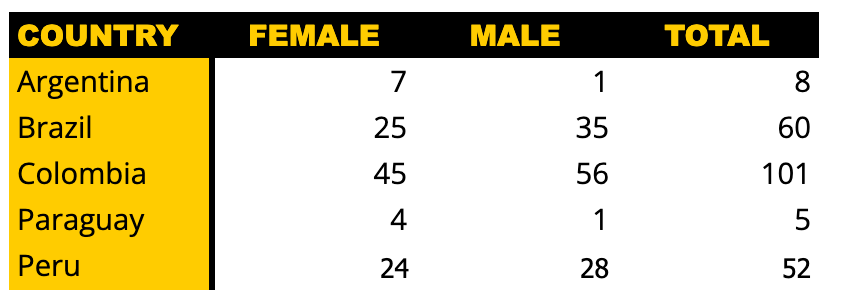
At the end of 2022, we employed 226 staff in South America. We are very close to reaching 50% participation of women in the staff composition of Solidaridad in South America. Out of 11 identified job types within Solidiaridad, South America has 7 of them with percentages that exceed 50% of females. Finally, we have a good balance in terms of employees’ employment history with Solidaridad, combining the new experiences and skills of newly recruited staff with the knowledge and experience of long-term employees.
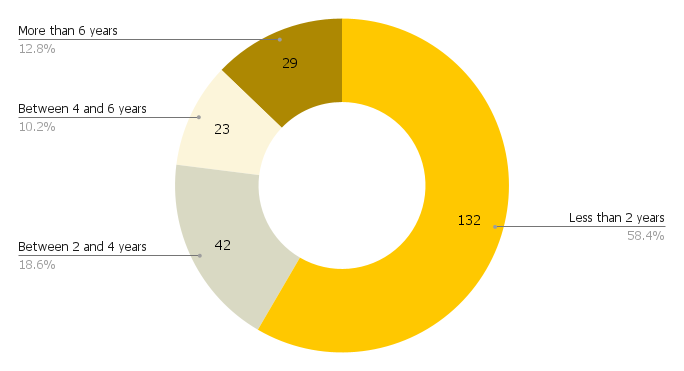
In 2022, Solidaridad achieved two significant organizational developments: restarting operations in Uruguay and consolidating operations in Suriname. The organization resumed operations in Uruguay after a gap of six years, launching a programme to support around 300 independent sugarcane producers to improve their practices and achieve certification according to the Production and Small Producers standards of Bonsucro by 2023 with ALUR. ALUR belongs to the National Administration of Fuels, Alcohol, and Portland and is an agroindustrial company with the only sugarcane processing industrial plant in Uruguay. The ALUR-Solidaridad programme is expected to promote sustainable sugarcane production in Uruguay, which has significant economic and social importance in the region. As part of this process, ALUR will use the app Extension Solution for its continuous improvement plan. In Suriname, Solidaridad is consolidating its presence with a new project contracted by the government with funding from the World Bank. This 27-month project, worth USD 2.8 million, aims to support small and medium enterprises in agriculture, food processing, tourism, and services to the oil sector to enhance their business performance and increase sales, ultimately promoting economic diversification in the country.
We have increased the contracted income for our South American offices from Euro 3.84M in 2021 to Euro 6.95M in 2022. This reflects an increase of 81% in this period. The source of this growth originates in funding from German GIZ — mainly a continuation of their support in Colombia and a new project in Brazil — from the U.S. Department of Agriculture and the World Bank. In addition to the stable contracts with the World Economic Forum to host the technical secretariat of the Tropical Forest Alliance in four countries, we secured additional contracts to implement specific missions.
In 2022 we also welcomed two new partners to scale our climate-smart agriculture model in the region. In partnership with the U.S. Agency for International Development (contracted by our colleagues in North America), we will implement the Amazonia Connect initiative in Brazil, Colombia and Peru in consortia with Earth Innovation Institute, National Wildlife Federation and the University of Wisconsin. In partnership with the PostCode Lottery Group (contracted by our colleagues in the Netherlands), we are implementing the Dream Fund programme in Colombia. Both activities will contribute to improving thousands of smallholders’ resilience to climate change effects, and strengthen their capacity to conserve native forests. In Colombia alone, the Dream Fund will work with up to 25,000 coffee farmers to access carbon credit markets.
With regards to the private sector, we continue our support to deploy Cargill’s initiatives for sustainability in the region by providing individual technical assistance, training, and digital tools to measure their progress on the field. This includes soybeans continual improvement projects in Argentina, Bolivia and Paraguay; projects involving forest restoration with cocoa and yerba mate (a local infusion) in Brazil; and increasing sourcing of certified palm oil in Colombia.
The organization has taken significant steps towards becoming more data-driven by reinforcing its abilities and tools for data management.
Data collection
We have improved our skills and ability to collect data for programmes and for assignments. In our programmes, our digital solutions developed in South America were used in Brazil, Argentina, Colombia, México, Uruguay, Peru, Bolivia, Ecuador and Paraguay to support the continuous improvement of more than 15 thousand farmers in 10 value chains (soy, sugarcane, coffee, cocoa, livestock, orange, babaçu, palm and banana). Our tools are also helping to improve our own required data analyses. In 2022 we advanced on the integration of our platform with the Cool Farm Tool, one of the most widely used farm-level GHG emissions calculators, making it possible to analyze at a glance how the adoption of good agricultural practices impacts a farm’s carbon footprint. Furthermore, we are working on integrating our monitoring data from geographic information systems as the teams gather and analyze more spatial information. Additionally, the organization has increased its ability to collect and process data for different tasks, conducting studies with large samples such as the data for the Small Farmer Atlas Atlas and living income studies, which included more than 1,300 surveys.
Data storage and integration
The Digital solutions and Project Management and Evaluation teams in South America carried out a pilot project to index existing datasets collected through in-house applications (Farming Solution and Extension Solution) with Solidaridad Network’s new data model. The objective was threefold: facilitate reporting on global indicators, create core content for future data collection and provide feedback on global indicators and data points to further refine their data model. An important deliverable of this project has been the development of a data dictionary for the data model, including definitions, data type specifications, codes and IDs used to identify and connect data for analysis. This is a key stage for further integration.
Data analysis and visualization
As the organization progresses through the stages of data management, analysis and visualization become easier. Each programme with digital solutions has its own dashboard tailored to their needs. The organization has also built expertise on designing dashboards for communication, such as the carbon footprint report in Colombia, the integrated analysis of the Small Farmer Atlas for Paraguay, Brazil and Peru, and a dashboard tailored for corporates to understand their carbon footprint designed with the coffee Community of Practice.
Interpretation and decision-making
As analysis progresses, data is increasingly integrated in implementation and decision-making. Teams who have used data for longer periods have reached a stage in which they are more familiar with using large data sets on a day-to-day basis. A good example of this is the RestaurAmazonia initiative that incorporates the use of data in different stages from coordination of field activities to impact, reporting and proposal writing. Programme Managers are also using more data from monitoring. This was supported by joint sessions carried out upon completion of the annual report to analyze the results of the year.
Evaluations conducted
In 2022 we did not conduct project evaluations. The team in Peru held an internal evaluation of the coffee programme to understand the achievements and difficulties of the programme in relation to the Multi-annual Strategic Plan and determine if it has the necessary resources to develop innovative business models for the coffee sector in Peru, as outlined in the strategic plan. The evaluation generated specific technical and operational recommendations for the programme.
In 2022, we launched 11 external publications. Our office in Brazil published a study on public policies for Technical Assistance and Rural Extensionl, highlighting the work done by civil society to ensure access to this service, and a carbon footprint study for the Matopiba region, focusing on the adoption of low-carbon practices without compromising profitability. In Colombia, we produced an analysis of coffee production costs to better understand the dynamics at the farm level to achieve a living income for producers. Finally, the mining programme issued a study that assesses the main gaps and opportunities that artisanal and small-scale miners face in achieving better working conditions and higher incomes in Peru, which helped in the making of the first national policy for the development of artisanal and small-scale mining.
We also conducted several learning exchanges. In Peru, we organized a session for field staff to exchange knowledge between the coffee and banana teams. This was a valuable opportunity for field officers to discuss both agronomic and engagement aspects and share their experiences with one another. We also organized a session to exchange learning between the implementers of the RECLAIM! Sustainability programme from Central and South America, where we identified common challenges and shared practical knowledge from peers. Furthermore, our team members actively participated in exchanges with other regional teams through various events, such as the Yellow Week and the RECLAIM! Sustainability Program meetings in Kenya. We recognize that our network of experience is our greatest strength, and we continue to build spaces for internal exchange and learning.
In 2022, several of our interventions reached the public eye through mentions in mainstream media such as Globo Rural in Brazil, Portafolio, Caracol TV and TVAgro in Colombia, and El Comercio in Peru. Furthermore, Colombia launched a documentary promoting low-carbon production and responsible consumption of dairy and beef products with over 23,000 views on YouTube. The Dream Fund initiative was featured at the Clinton Global Initiative in New York, and our experts were present at the New York Climate Week, Roundtable on Sustainable Palm Oil, Organisation for Economic Co-operation and Development, and ICTforAg 2022 conferences, the Innovation Forum, and the International Circular Economy Forum, among other events.
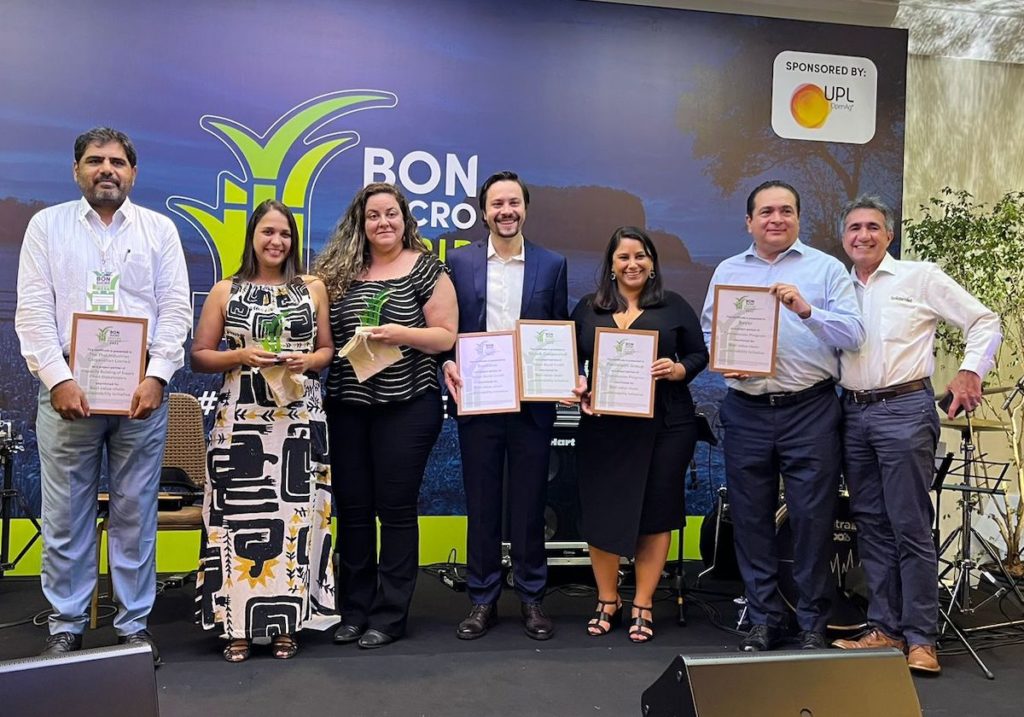
Our project MudaCana in partnership with Orplana won the Bonsucro Inspire Award, while Ecoban, a start-up for recycling banana plastic waste in Peru won a Peru for the SDGs award. Climate Links selected one of our pictures from Pará, in Brazil, to feature in their 2023 calendar. The cocoa produced by smallholders we support in the Brazilian Amazon once again won several awards, accumulating 18 accolades for their premium quality so far.
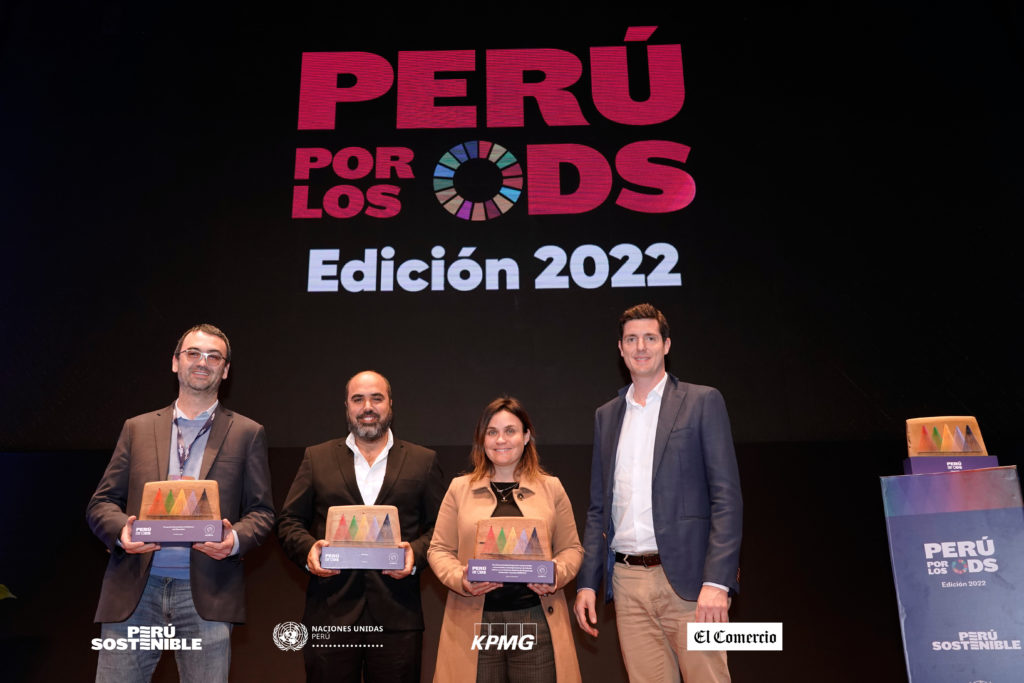
In 2022, we welcomed 7,612 new followers — reaching 25,303 followers on social media in Spanish and Portuguese — and 61,202 users to our regional webs. On LinkedIn we got 13.93M impressions and on Facebook we reached 6.79M people.
In Information and Technology, we focused on aligning our systems with Planning, Monitoring, Evaluation and Learning (PMEL) and strengthening our security practices. On PMEL, the South America Digital solutions and PMEL teams carried out a pilot project to index existing datasets collected through in-house applications (Farming Solution and Extension Solution) with Solidaridad Network’s new data model. The objective was threefold: facilitate reporting on global indicators, create core content for future data collection and provide feedback on global indicators and data points to further refine the PMEL data model. An important deliverable of this project has been the development of a data dictionary for the PMEL data model, including definitions, data type specifications, codes and IDs used to identify and connect data for analysis.
Regarding security, Solidaridad’s digital unit in South America made the decision to invest in the improvement of its information security practices and hired a consultancy specialized in cybersecurity to conduct an assessment of current security and privacy practices and develop a tailored security plan based on recognized frameworks (NIST, COBIT, ISO 27001, CIS and ITIL) and applicable legislations. In addition to this assessment, the digital solutions team carried out an external pentest to evaluate the security of its IT infrastructure and adopted a Vulnerability assessment tool (Nessus) to identify and manage vulnerabilities and security incidents. Based on the outcomes of the security, privacy and vulnerability assessments, an action plan was developed for a gradual improvement of the region’s policy and practices related to information security and data protections. Implementation of this action plan will start in 2023.
Regular communication takes place with all employees regarding the reporting of incidents or cases. The procedure and contact persons, including the person of trust and integrity advisor, are well-known by all employees. To date, there have been no reports of inappropriate conduct within the region.
To reinforce the integrity system, an action plan was implemented at regional level. The plan consisted of several measures, including communication actions such as providing informative snippets about the Code of Conduct, clarifying the roles and responsibilities of the Person of Trust and Integrity Advisor, and using case studies to help employees better understand the Code of Conduct. In addition, workshops were conducted to ensure that all employees have read and understood the Code of Conduct, to educate employees on inclusive and diversity concepts, to help managers manage diversity and inclusion within their teams, and to teach employees how to report a case. These measures demonstrate our commitment to promoting a culture of integrity and preventing inappropriate behavior.
Finance
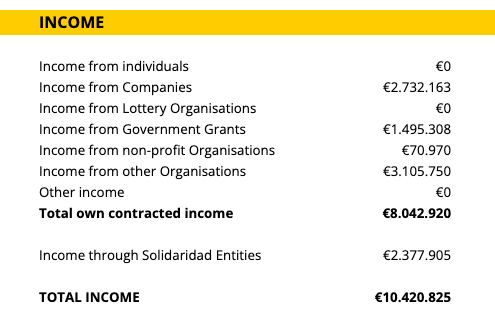
Solidaridad South America has exceeded its own-contracted funding goals by executing EUR 7M, nearly double the amount executed in 2021 and 42% more than the budgeted amount for 2022. The increase in funding was primarily due to the negotiation of new funds from JBS, World Economic Forum, The World Bank, GIZ, Kering, Partners of the Americas, and local donors from the public and private sectors. This additional funding enabled us to cover the budget deficit of 64K EUR for 2022, which corresponded to operational costs.
The region has also implemented EUR 2.2K in funds received from Europe, which mainly came from the Dutch Government, and from North America through funds from USAID. However, the former had an under-spent of 31% compared to the budget due to delays in the start of activities.
Expenditures were executed in accordance with the income received.
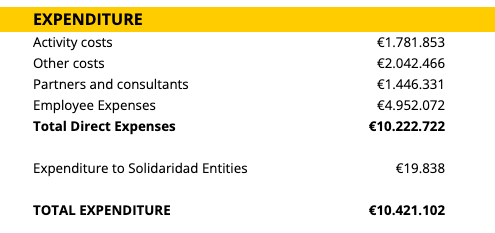
The full audited annual statements of 2022 are available below.

